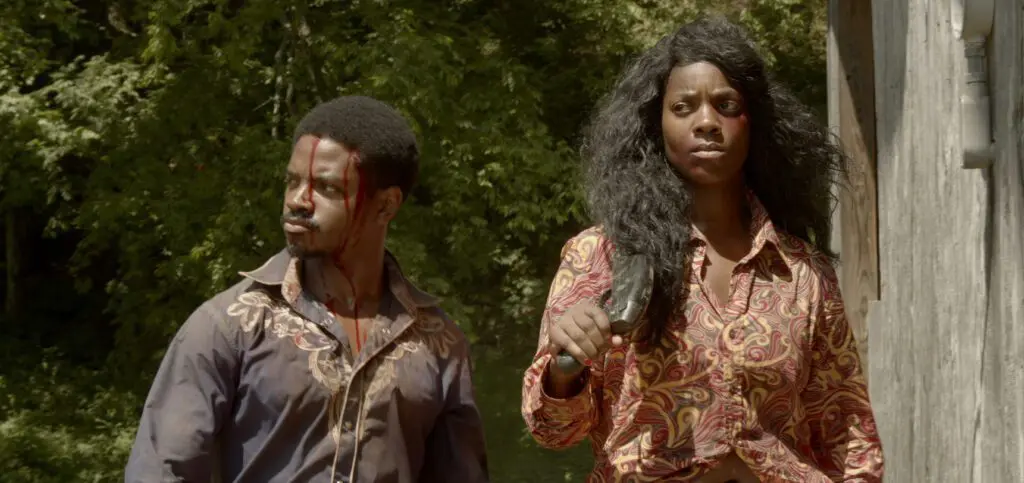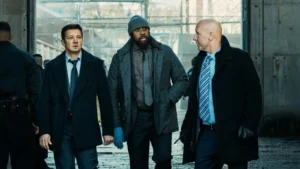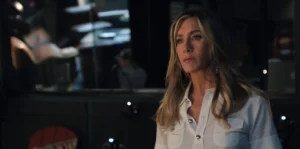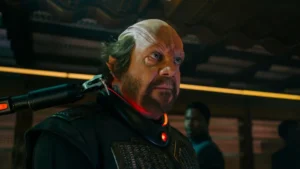Lovers of genre cinema are used to throwbacks, homages, and nostalgia fests by now, but here’s something I don’t think any of us have seen to date: a seventies-style grindhouse film about a confrontation with a cannibalistic Ku Klux Klan group. Death Ranch is not just that, but it is also – get this – made by a British director who had never made anything in the USA before, and young enough to have never seen the seventies in his life either.
Death Ranch embraces the style with gusto, and when I talked to writer/director Charlie Steeds last week, he showed such excitement and energy about the film that it was like talking to someone who had just returned from the holiday of a lifetime. Unlike the last couple of interviews I carried out, with several people (virtually a party, in one case), it was just Charlie this time; but that was good, it allowed for a different kind of depth to the discussion
“It must have been an absolute riot to make,” I told him. “It was, it was,” said Charlie, “I’m glad you liked it. To be honest, when I have the producer and cast and so on, I can’t get a word in, because they’re all American.”
A natural introduction to my first question, then: what was it like to make something so American? “Well, I’d been to America before, but never filmed anything there, and I’d never been to Tennessee. I ended up over there because I befriended, over the internet, another filmmaker, Aaron Mirtes, as we were both making films for High Octane Pictures. He basically said ‘you can come over to Tennessee any time, I’ll produce with you, I’ve got a crew’. I’d had the idea for the movie for a long time, and an investor came along, and it all just added up. I was there for a month, and when I arrived there, every single person on the whole film, well I’d never met any of them before. Not just me: no-one knew each other, but we’d all spoken online. Luckily for us, we all got on so well, and I think we instantly bonded by the script and the subject matter. Everyone knew what they were coming there to do, they’d read the script, they knew that it was going to be an interesting shoot anyway, so we all had to become really friendly, really quick. To make something like this, you have to be friendly, there had to be a fun vibe on set. You couldn’t have any tensions between people, because there was such potentially awkward subject matter and scenes. We all had a really good time.”
This wasn’t the first horror Charlie had written or directed before, and each one was different, but honestly, not this different. Naturally, I asked where the idea for Death Ranch came from. “Well, basically I’d been wanting to do something inspired by grindhouse and exploitation movies. I love all these Jack Hill movies, like Foxy Brown, Coffy, and The Big Bird Cage. I’m a big Tarantino fan as well, and his films are littered with references to films like those. So I knew I’d been wanting to do something like that, and then I think I was watching a load of grindhouse movie trailers and there was one, I think, called Brotherhood of Death, which includes a sequence in which the black characters come up against the KKK, and they dressed up in the Klansmen robes and sabotaged them. That’s only like one scene from the movie, but it’s in the trailer, and it made me think. When I look, myself, for ideas of horror movies, I like to look at things that horrify me, and one of the things that horrifies me a lot – and of course a lot of people – is the racism, especially the history in America, the KKK and so on. And I just thought why is there not a film like this? There are films that touch on it. Whenever you see the KKK represented in movies, it’s always a matter-of-fact, historical portrayal of it all, with the black characters being so victimized. Of course, it’s important to document the history of it, but also (like in Tarantino’s Django Unchained), it’s good to see an alternate history. Wouldn’t it be so cathartic to see the black characters coming up against the KKK and totally annihilating them? A revenge story would be cool.
“I didn’t make the script for about three years, because I was kind of scared at first. I didn’t know if I should, as a white, British guy from London. Is it really my business to go over to Tennessee and make this sort of movie? In fact, I got away with so much just because I was British. Everyone in Tennessee kept telling me ‘it’s alright, because you’re British!’ Personally, I don’t quite understand it, but they said that because I was removed from the history, it was OK to do this sort of thing. Even when I was at FrightFest last year, at the filmmakers’ dinner, I was speaking to some of the American directors there and told them about the film (I filmed it last year in May, and then had a long post-production) and they said ‘I can’t believe you made this, but because you’re British, you can get away with it!’.”
I found that fascinating: it was clearly an audacious thing to do, but Charlie had been able to look at the historical issues from outside, removed from them somewhat.
The central characters in Death Ranch are three siblings, who get together because one of them, Brandon (Deiondre Teagle), had escaped from prison and the others find him somewhere to lie low (which, of course, doesn’t last for long). Brandon intrigued me because ambiguity was neatly written into his slight backstory: we never find out what he had been in prison for, or whether he was indeed guilty. “When I came up with the script, because I wanted it to be exploitation, and I was playing on the sort of clichés of that genre, you often get antiheroes who are on the run, Bonnie and Clyde types of characters, so I thought it would be really great to have a group of antiheroes to be my main characters. But when I wrote the thing, I realized the potential statement it’s making to have the black characters triumphant and overthrow the KKK, I thought they shouldn’t be the antiheroes. I was going to start with a bunch of criminals on the run, which would have made them powerful because the KKK wouldn’t realize they were criminals and therefore armed and dangerous, which gives them the upper hand. But I decided to get rid of all that, and not make them criminals, but I still needed the idea that they were on the run from the police because that’s why they’re hiding in the ranch in the first place.
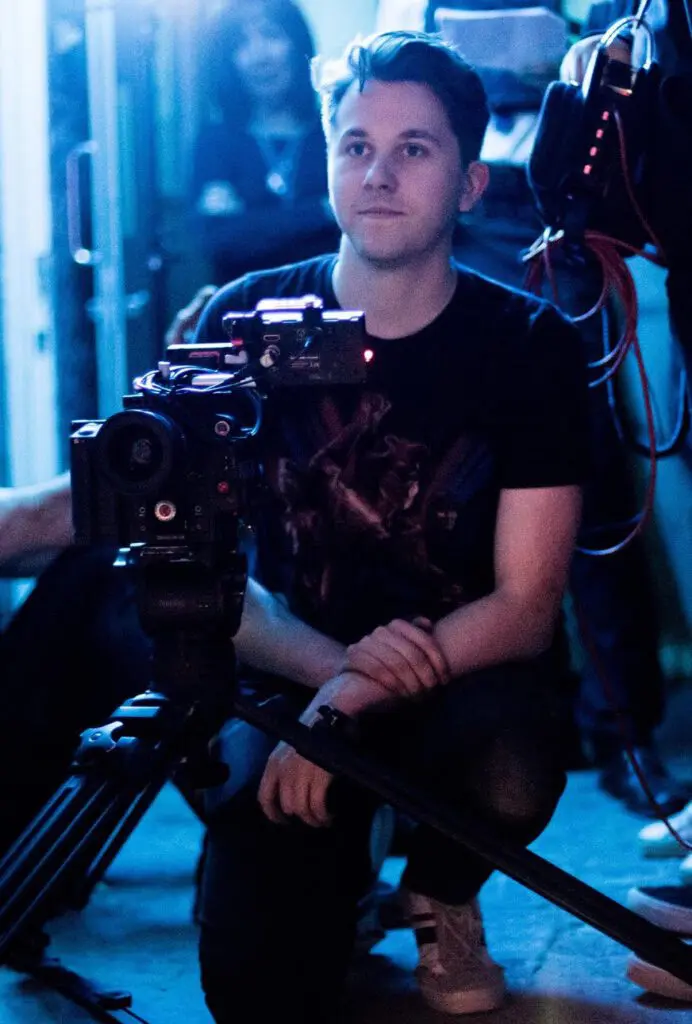
“So that’s why Brandon’s history is a bit ambiguous because I don’t want people to judge him as a criminal, so that’s left up to the audience. I hope they’ll simply see him as a misguided character, at a crossroads in his life, needing the influence of his older siblings. It gives a sort of explanation of how someone can go from being a seemingly innocent family man to guns and decapitation and this sort of stuff because it goes to such an extreme place.”
When watching Death Ranch, I had found the use of cannibal racists a refreshing change, having become jaded of tropes such as Nazi zombies lately. I asked if there was a trope that Charlie was particularly tired of or any that he would like to explore. This got him thinking. “There’s one thing I get tired of, which does tie into the style of Death Ranch: I get tired of people trying to recapture or recreate movies of the past. We’re getting a lot of “eighties slasher movies” or people trying to recreate The Thing, for example. Doing something that’s already been done, for nostalgia purposes, with the synth soundtrack and so on. But then, at the same time, that’s what I do with my company, but for a reason. The way I see it is in terms of editing, production design, camera angles, we’ve got like a hundred years’ worth of techniques and styles we can choose from, but many filmmakers use the techniques of the last five years, say, and then the films are set in modern suburban houses, all clean and pristine, shot in nice HD. What I’m trying to do – like in Death Ranch – is create new films and new experiences using old school techniques, say the way we shot it, and the grain added in post-production. My film isn’t trying to be a Blaxploitation from the seventies, but tell a new story.
“In terms of tropes I’d like to use, it really depends on the genre. I really like making different subgenres of horror. I’ve done a haunted house film, a couple of backwoods cannibal movies (I guess this one even fits into that style). But I’d love to do a cannibal jungle movie, like Cannibal Holocaust, something like that, maybe in the style of The Big Bird Cage, with people imprisoned, but with Italian cannibal zombies. So in that case, when I come to write the script, I’d watch a list of the types of movies I love, like Dr. Butcher, M.D., tropical island zombie movies; and then pick some little things to pay tribute, little nods to other things in the genre.”
I mentioned Death Ranch was actually the second Grimmfest film I’d seen for this press week set in the seventies; and the FrightFest catalog included eighties and other retro films. So – as per They Reach – I asked Charlie what is it about those two decades that has caught the interest of filmmakers just now? “People who were kids in those decades are now adults and the majority of people buying DVDs and showing up to festivals. As a teenager, you can’t so easily book a hotel for five days to go to FrightFest, but into your thirties and forties, you can attend these things. You love the films you grow up with, the horror you watch in your youth is always going to be classic and something you look back on fondly. Having said that, though, I wasn’t around in the seventies or eighties, but still view that period as a golden age; the late seventies is my favorite for horror: the gore, the look, not caring about political correctness.”
That prompted me to comment on something I admired in Death Ranch: the sexual assaults were not glamorized in any way, which was frequently done in older films. Thus Charlie Steeds had used the seventies grindhouse style and moved it forwards for our more modern eyes. “That’s good to hear. Even the fact that I included a scene like that took it to the edges of bad taste and the scene is so grotesque that it almost becomes darkly humorous, almost a parody of a gratuitous scene. But I’d only include one of those scenes if I was going to do it in a way that’s powerful to the story and the characters. Above all else, the characters and plot are what we’re there for. And I will say that the actress, Faith Monique, she did such an amazing job on that day. On the day, she kept herself in the emotional state all day, and it was ten hours of filming in this sort of bunker; when we were having lunch, joking and laughing (because I do keep the atmosphere light-hearted, especially when filming the heavy stuff), she didn’t want any involvement in that and didn’t even want to get up from being tied on the mattress, just wanted to stay distressed. She also said, though, that it was her favorite day of filming, to get into that emotional state. She went the distance and sold that scene. I was really lucky with all the cast, they threw themselves into it, gave me authentic performances because it could have gone either way. Every single actor really responded to the script and gave it such respect, which made it an easy shoot: it all came together.”
Of course, I had to ask what life and work had been like since the pandemic had come along. “Luckily, I had two films that still needed editing when the lockdown started. One was Death Ranch, which was already some way along; and I’d just finished filming a werewolf movie, that I’d shot in January, February and March. So I edited non-stop through the lockdown. Editing normally takes me about four months, but this time I’ve edited two films in four months; so as there were no distractions of seeing friends and going out, I used the lockdown time to get things finished. Then I can get out and make more. I have lots of offers on the table for what I’ll be doing next. A week today, I leave to start the next movie, with two weeks of set-building and then three weeks of filming; it’s a Halloween-style slasher this time.”
I was around in the seventies and eighties, so dared to ask what felt like a cheeky question; whether Charlie’s age had ever worked against him as a filmmaker. “It used to, when I was making my first and second horror films, it did work against me. The actors would show up and not quite trust you because you’re so young. You’d suggest things, and then they’d think they know better. But they’re in the hands of the filmmaker, you’ve written the script, you’ve planned it all. But I wrote the script, you can’t tell me what I should be doing with it. Nowadays, because I’ve got a bunch of feature films behind me already and I’m young, it helps in loads of different ways. For example, I’m only a year older than the lead actor in Death Ranch, and he was shocked, but it meant we had lots to talk about, lots in common, an easier-going relationship than he might have with, say, a fifty-year-old director. We’re just two lads of the same age, so it’s not at all intimidating to him. On set, I’m chilled out and that makes a lot of the actors feel safe: I’m just a young guy, and there’s no hierarchy around me, we’re all there as friends to make a movie. When you’re doing something like Death Ranch with sensitive subjects, it can really help if they’re feeling relaxed.”
I asked how he pushed past the obstacles of trust that he’d mentioned in the early days. “There’s an easy answer here. Some actors would be difficult, not knowing what I was making. Sure it was amateur, and it’s slowly becoming less amateur; but when they saw the movie, the attitude changes and they’re my best buddy and want to come back for the next one.”
That led me to ask what it’s like to be both writer and director, with complete ownership of a script. “There are real pros and cons. As a director, you have to know all the answers about your film, so it’s no good if you’re not really invested in a script. I’ve made two horror films from my own scripts and then when I watch them with an audience, I then learn from a writing perspective what I need to improve on. Then for my third movie was directing someone else’s script: it took all the weight off my shoulders from a writing perspective, but it then let me focus on the directing skills only. You get more put to the test if it’s not your own script. I’ve got to think how to take what someone else has written and add my directing style to raise it up and bring it to life. So I learned loads about the directing from that film. It’s worth doing both, directing one’s own script and someone else’s”.

